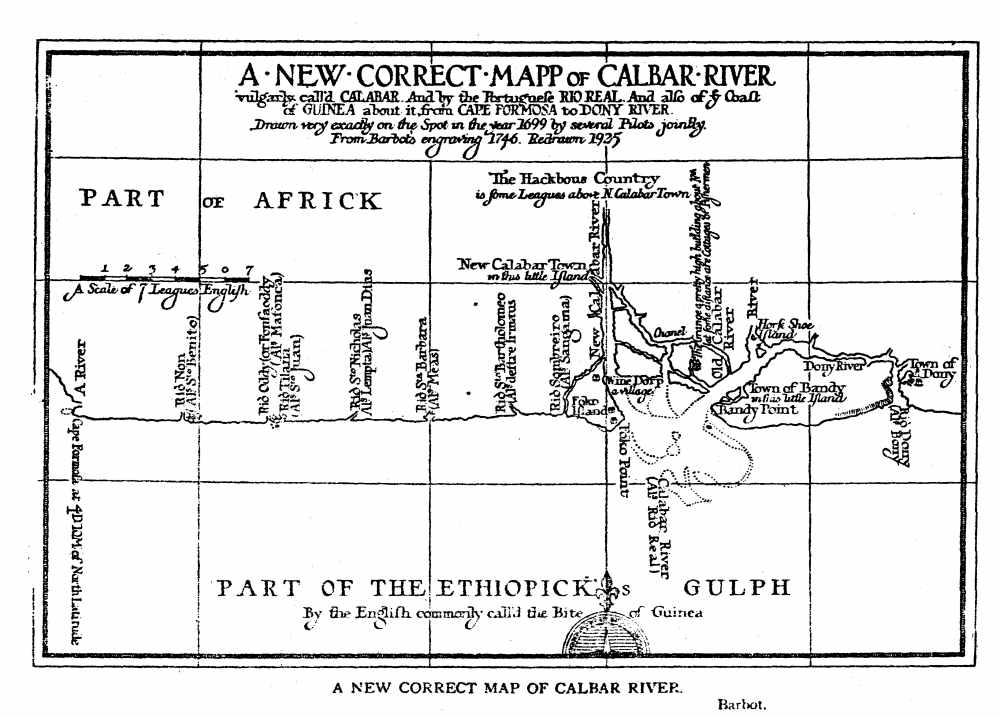|
|
Old Calabar
Calabar is the region of the
Cross River Delta in Nigeria that Cubans call Carabali. This cultural area
extends into Cameroon.
Old Calabar
Rediscovered, Nkparom C. Ejituwu. The Multidisciplinary
Approach to African History; essays in honor of Ebiegberi Joe Alagoa,
edited by N. Ejituwu, 133‑50. Hisis Press, Port Harcourt, for University
of Port Harcourt Press, 1998 [PDF, 1MB]
Note from Victor Manfredi:
This paper [by Nkparom C.
Ejituwu] discusses the mysteries of the name Kalabar, adding new details.
In particular, it mentions a common pattern of a settlement being
refounded under the same name but with the prefix "new". So the Dutch
decision to call the Efik capital "Old Calabar" was not just a stray
error. There was surely a real place called "Old Kalab.ari.", and it was
indeed probably to the east of the real place called "New Kalab.ari.", bit
not as far to the east as the Efik capital. This simplifies the scenario
which led to the confusion on the maps. The real "Old Kalab.ari." was
shown on Barbot's 1699 map [below].

From
Victor
Manfredi's website:
The cartographic errorism — what would today be called an
unavoidable and regrettable targeting error — responsible for
sticking the name "Calabar" on the Efik capital is much less complex in
legendary inspiration, and slightly less farfetched in geographic
distance, than modern historians have supposed. As quoted in
the paper (p. 254), Jones wondered whether "the European attribution
of the name Old Calabar to the Efik people could be a reflection of the
Korome myth of origin [… about] the place which the Opukoroye line of
Kalab̩arị kings claimed as their original home" (1965, 159). More
plausibly and prosaically, Ejituwu suggests that the intended referent of
the "old" term in this myth was not the Efik‑speaking village group on the
"Rio da Cruz", but instead a Kalab̩arị‑speaking settlement (subsequently
abandoned) on a branch of the "Rio Real" estuary labeled "Old Calabar
River" by Barbot's 1699 "New Correct Mapp of Calbar River" (reprinted by
Barbot 1732, 462 and Ejituwu 1998, 137). Further ambiguity (as if any were
required) is supplied by the fact that "when New Calabar itself segmented
from 1879 to 1885 […] [t]he Kalab̩arị in Bakana, Abonema and Buguma
continued to regard New Calabar as Elem Kalab̩arị, which means 'Old
Calabar', and the latter continued to appear in official documents till
1931" (Ejituwu 1998, 142). None of this confusion is surprising, given
that adnominal modifiers like
old and new are indexical "shifters" whereas map terms
ideally aren't. But unlike Jones' frankly speculative account of the Efik
mistaken identity for "Calabar", Ejituwu's explanation of the mishap has
independent documentary support and is moreover simpler: no need to assume
that Dutch mappers of 9ja's eastern coast had even indirect access to
Kalab̩arị dynastic tales, if what happened is that they ploddingly
reproduced some coastal traders' casual misplacement of the older of the
"Old" Calabars — i.e. the one so designated by locals in the 17th century
— by a few hundred miles, to a different slaving depot a few estuaries
further along to the east, albeit in a very different linguistic
territory.
|



